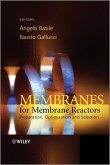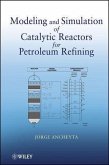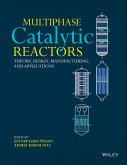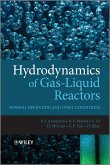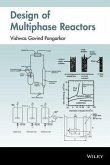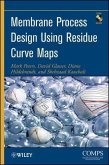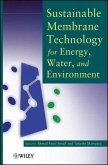

Alle Infos zum eBook verschenken

- Format: ePub
- Merkliste
- Auf die Merkliste
- Bewerten Bewerten
- Teilen
- Produkt teilen
- Produkterinnerung
- Produkterinnerung

Hier können Sie sich einloggen

Bitte loggen Sie sich zunächst in Ihr Kundenkonto ein oder registrieren Sie sich bei bücher.de, um das eBook-Abo tolino select nutzen zu können.
Membrane reactors combine membrane functions such as separation, reactant distribution, and catalyst support with chemical reactions in a single unit. The benefits of this approach include enhanced conversion, increased yield, and selectivity, as well as a more compact and cost-effect design of reactor system. Hence, membrane reactors are an effective route toward chemical process intensification. This book covers all types of porous membrane reactors, including ceramic, silica, carbon, zeolite, and dense metallic reactors such as Pd or Pd-alloy, oxygen ion-conducting, and proton-conducting…mehr
- Geräte: eReader
- mit Kopierschutz
- eBook Hilfe
- Größe: 18.81MB
![Membranes for Membrane Reactors (eBook, ePUB) Membranes for Membrane Reactors (eBook, ePUB)]() Membranes for Membrane Reactors (eBook, ePUB)155,99 €
Membranes for Membrane Reactors (eBook, ePUB)155,99 €![Modeling and Simulation of Catalytic Reactors for Petroleum Refining (eBook, ePUB) Modeling and Simulation of Catalytic Reactors for Petroleum Refining (eBook, ePUB)]() Jorge AncheytaModeling and Simulation of Catalytic Reactors for Petroleum Refining (eBook, ePUB)127,99 €
Jorge AncheytaModeling and Simulation of Catalytic Reactors for Petroleum Refining (eBook, ePUB)127,99 €![Multiphase Catalytic Reactors (eBook, ePUB) Multiphase Catalytic Reactors (eBook, ePUB)]() Zeynep Ilsen ÖnsanMultiphase Catalytic Reactors (eBook, ePUB)136,99 €
Zeynep Ilsen ÖnsanMultiphase Catalytic Reactors (eBook, ePUB)136,99 €![Hydrodynamics of Gas-Liquid Reactors (eBook, ePUB) Hydrodynamics of Gas-Liquid Reactors (eBook, ePUB)]() Barry AzzopardiHydrodynamics of Gas-Liquid Reactors (eBook, ePUB)143,99 €
Barry AzzopardiHydrodynamics of Gas-Liquid Reactors (eBook, ePUB)143,99 €![Design of Multiphase Reactors (eBook, ePUB) Design of Multiphase Reactors (eBook, ePUB)]() Vishwas G. PangarkarDesign of Multiphase Reactors (eBook, ePUB)109,99 €
Vishwas G. PangarkarDesign of Multiphase Reactors (eBook, ePUB)109,99 €![Membrane Process Design Using Residue Curve Maps (eBook, ePUB) Membrane Process Design Using Residue Curve Maps (eBook, ePUB)]() Mark PetersMembrane Process Design Using Residue Curve Maps (eBook, ePUB)137,99 €
Mark PetersMembrane Process Design Using Residue Curve Maps (eBook, ePUB)137,99 €![Sustainable Membrane Technology for Energy, Water, and Environment (eBook, ePUB) Sustainable Membrane Technology for Energy, Water, and Environment (eBook, ePUB)]() Sustainable Membrane Technology for Energy, Water, and Environment (eBook, ePUB)127,99 €
Sustainable Membrane Technology for Energy, Water, and Environment (eBook, ePUB)127,99 €-
-
-
Dieser Download kann aus rechtlichen Gründen nur mit Rechnungsadresse in A, B, BG, CY, CZ, D, DK, EW, E, FIN, F, GR, HR, H, IRL, I, LT, L, LR, M, NL, PL, P, R, S, SLO, SK ausgeliefert werden.
- Produktdetails
- Verlag: John Wiley & Sons
- Seitenzahl: 304
- Erscheinungstermin: 3. März 2015
- Englisch
- ISBN-13: 9781118672556
- Artikelnr.: 42508929
- Verlag: John Wiley & Sons
- Seitenzahl: 304
- Erscheinungstermin: 3. März 2015
- Englisch
- ISBN-13: 9781118672556
- Artikelnr.: 42508929
- Herstellerkennzeichnung Die Herstellerinformationen sind derzeit nicht verfügbar.
1 Fundamentals of Membrane Reactors 1
1.1 Introduction 1
1.2 Membrane and Membrane Separation 1
1.2.1 Membrane Structure 2
1.2.2 Membrane Separation 4
1.2.3 Membrane Performance 6
1.3 Inorganic Membranes 7
1.3.1 Types of Inorganic Membranes 7
1.3.2 Fabrication of Inorganic Membranes 11
1.3.3 Characterization of Inorganic Membranes 13
1.3.4 Applications of Inorganic Membranes 13
1.4 Inorganic Membrane Reactors 14
1.4.1 Basic Principles of Membrane Reactors 14
1.4.2 Incorporation of Catalyst in Membrane Reactors 17
1.4.3 Configuration of Membrane Reactors 20
1.4.4 Classification of Membrane Reactors 23
References 25
2 Porous Membrane Reactors 27
2.1 Introduction 27
2.2 Gas Permeation in Porous Membranes 28
2.2.1 Types of Porous Membranes 28
2.2.2 Transport Mechanisms 30
2.2.3 Gas Permeation Flux through Porous Membranes 33
2.3 Preparation of Porous Membranes 38
2.3.1 Dip-Coating Method 39
2.3.2 Sol-Gel Method 41
2.3.3 Chemical Vapor Deposition Method 42
2.3.4 Phase Inversion Method 44
2.3.5 O ther Preparation Methods 46
2.4 Porous Membranes for Chemical Reactions 47
2.4.1 Membrane Materials 47
2.4.2 Membrane Functions 49
2.5 Catalysis in Porous Membrane Reactors 50
2.5.1 Catalyst in Membrane Reactors 50
2.5.2 Catalyst Deposition in Porous Membranes 52
2.6 O peration of Porous Membrane Reactors 53
2.6.1 Packed Bed Membrane Reactors 53
2.6.2 Catalytic Membrane Reactors 55
2.6.3 Coupling of Membrane Functions 57
2.6.4 Non-uniform Distribution of Membrane Permeability 57
2.7 Applications of Porous Membrane Reactors 59
2.7.1 Dehydrogenation Reactions 59
2.7.2 Reforming Reactions for Hydrogen Production 60
2.7.3 Partial Oxidation Reactions 62
2.7.4 Gas-Liquid-Solid Multiphase Reactions 65
2.7.5 O ther Reactions 66
2.8 Prospects and Challenges 67
Notation 68
References 70
3 Zeolite Membrane Reactors 75
3.1 Introduction 75
3.2 Permeation in Zeolite Membranes 76
3.2.1 Types of Zeolite Membranes 76
3.2.2 Transport Mechanisms 76
3.2.3 Permeation Flux in Zeolite Membranes 78
3.3 Preparation of Zeolite Membranes 80
3.3.1 In-Situ Crystallization Method 80
3.3.2 Secondary Growth Method 82
3.3.3 Vapor-Phase Transport Method 84
3.3.4 Microwave Synthesis Method 85
3.4 Configuration of Zeolite Membrane Reactors 86
3.4.1 Packed Bed Membrane Reactor 87
3.4.2 Catalytic Membrane Reactor 87
3.4.3 Pervaporation Membrane Reactor 88
3.4.4 Membrane Microreactor 89
3.5 Applications of Zeolite Membrane Reactors 90
3.5.1 Dehydrogenation Reactions 90
3.5.2 Dehydration Reactions 90
3.5.3 Oxidative Reactions 93
3.5.4 Isomerization Reactions 94
3.6 Prospects and Challenges 94
Notation 96
References 97
4 Dense Metallic Membrane Reactors 101
4.1 Introduction 101
4.2 Gas Permeation in Dense Metallic Membranes 102
4.2.1 Types of Dense Metallic Membranes 102
4.2.2 Hydrogen Permeation Mechanism in Pd-Based Membranes 103
4.2.3 Effect of Substrate on H2 Permeation 108
4.3 Preparation of Dense Metallic Membranes 110
4.3.1 Cold-Rolling and Diffusion Welding Method 110
4.3.2 Electroless Plating Method 111
4.3.3 Electroplating Method 113
4.3.4 Chemical Vapor Deposition Method 114
4.3.5 High-Velocity Oxy-Fuel Spraying Method 115
4.3.6 Magnetron Sputtering Method 115
4.3.7 Summary 115
4.4 Configurations of Metallic Membrane Reactors 117
4.4.1 Packed Bed Membrane Reactor 117
4.4.2 Membrane Microreactor 122
4.5 Applications of Dense Metallic Membrane Reactors 123
4.5.1 Dehydrogenation Reactions 123
4.5.2 Reforming Reactions for H2 Production 126
4.5.3 Direct Hydroxylation of Aromatic Compounds 133
4.5.4 Direct Synthesis of Hydrogen Peroxide 134
4.6 Challenges and Prospects 135
Notation 136
References 137
5 Dense Ceramic Oxygen-Permeable Membrane Reactors 143
5.1 Introduction 143
5.2 Oxygen Permeation in Dense Ceramic Membranes 146
5.2.1 Membrane Materials 146
5.2.2 O xygen Permeation Flux in MIEC Membranes 148
5.3 Preparation of Dense Ceramic Membranes 154
5.3.1 Isostatic Pressing 154
5.3.2 Extrusion 154
5.3.3 Phase Inversion 155
5.3.4 Slurry Coating 156
5.3.5 Tape Casting 156
5.4 Dense Ceramic Membrane Reactors 157
5.4.1 Principles of Dense Ceramic Membrane Reactors 157
5.4.2 Configurations of Dense Ceramic Membrane Reactors 159
5.5 Applications of Dense Ceramic Oxygen Permeable Membrane Reactors 160
5.5.1 Partial Oxidation of Methane to Syngas 161
5.5.2 Oxidative Coupling of Methane 165
5.5.3 Oxidative Dehydrogenation of Alkanes (Ethane and Propane) 169
5.5.4 Decomposition of H2O, NO x, and CO2 170
5.6 Prospects and Challenges 176
Notation 178
References 179
6 Proton-Conducting Ceramic Membrane Reactors 187
6.1 Introduction 187
6.2 Proton/Hydrogen Permeation in
Proton-Conducting Ceramic Membranes 187
6.2.1 Proton-Conducting Ceramics 187
6.2.2 Hydrogen/Proton Permeation in Mixed Conducting Membranes 189
6.3 Preparation of Proton-Conducting Ceramic Membranes 193
6.3.1 Suspension Coating 193
6.4 Configuration of Proton-Conducting Membrane Reactors 195
6.5 Applications of Proton-Conducting Ceramic Membrane Reactors 198
6.5.1 Dehydrogenation Coupling of Methane 199
6.5.2 Dehydrogenation of Alkanes into Alkenes 201
6.5.3 WGS Reaction and Water Electrolysis for Hydrogen Production 203
6.5.4 Decomposition of NOx 205
6.5.5 Synthesis of Ammonia 206
6.5.6 Challenges and Future Work 208
Notation 210
References 210
7 Fluidized Bed Membrane Reactors 215
7.1 Introduction 215
7.2 Configurations and Construction of FBMRs 216
7.3 Applications 222
7.3.1 Methane Steam Reforming and Dehydrogenation Reactions 222
7.3.2 Partial Oxidation Reactions 224
7.4 Prospects and Challenges 224
References 225
8 Membrane Microreactors 227
8.1 Introduction 227
8.2 Configurations and Fabrication of Membrane Microreactors 228
8.2.1 Plate-Type Membrane Microreactors 228
8.2.2 Tubular Membrane Microreactors 233
8.3 Applications of Membrane Microreactors 238
8.3.1 Pd-MMRs for Hydrogenation/Dehydrogenation Reactions 238
8.3.2 Zeolite-MMRs for Knoevenagel Condensation and Selective Oxidation
Reactions 241
8.3.3 Catalytic MMRs for G-L-S Reactions 243
8.4 Fluid Flow in Membrane Microreactors 244
8.5 Prospects and Challenges 246
References 247
9 Design of Membrane Reactors 251
9.1 Introduction 251
9.2 Design Equations for Membrane Reactors 251
9.2.1 Packed Bed Membrane Reactors 252
9.3 Flow-Through Catalytic Membrane Reactors 259
9.3.1 Fluidized Bed Membrane Reactors 261
9.4 Modeling Applications 264
9.4.1 Oxidative Dehydrogenation of n-Butane in a Porous Membrane Reactor
264
9.4.2 Coupled Dehydrogenation and Hydrogenation Reactions in a Pd/Ag
Membrane Reactor 265
9.4.3 POM in a Dense Ceramic Oxygen-Permeable Membrane Reactor 268
9.5 Concluding Remarks 274
Notation 275
References 277
Index 279
1 Fundamentals of Membrane Reactors 1
1.1 Introduction 1
1.2 Membrane and Membrane Separation 1
1.2.1 Membrane Structure 2
1.2.2 Membrane Separation 4
1.2.3 Membrane Performance 6
1.3 Inorganic Membranes 7
1.3.1 Types of Inorganic Membranes 7
1.3.2 Fabrication of Inorganic Membranes 11
1.3.3 Characterization of Inorganic Membranes 13
1.3.4 Applications of Inorganic Membranes 13
1.4 Inorganic Membrane Reactors 14
1.4.1 Basic Principles of Membrane Reactors 14
1.4.2 Incorporation of Catalyst in Membrane Reactors 17
1.4.3 Configuration of Membrane Reactors 20
1.4.4 Classification of Membrane Reactors 23
References 25
2 Porous Membrane Reactors 27
2.1 Introduction 27
2.2 Gas Permeation in Porous Membranes 28
2.2.1 Types of Porous Membranes 28
2.2.2 Transport Mechanisms 30
2.2.3 Gas Permeation Flux through Porous Membranes 33
2.3 Preparation of Porous Membranes 38
2.3.1 Dip-Coating Method 39
2.3.2 Sol-Gel Method 41
2.3.3 Chemical Vapor Deposition Method 42
2.3.4 Phase Inversion Method 44
2.3.5 O ther Preparation Methods 46
2.4 Porous Membranes for Chemical Reactions 47
2.4.1 Membrane Materials 47
2.4.2 Membrane Functions 49
2.5 Catalysis in Porous Membrane Reactors 50
2.5.1 Catalyst in Membrane Reactors 50
2.5.2 Catalyst Deposition in Porous Membranes 52
2.6 O peration of Porous Membrane Reactors 53
2.6.1 Packed Bed Membrane Reactors 53
2.6.2 Catalytic Membrane Reactors 55
2.6.3 Coupling of Membrane Functions 57
2.6.4 Non-uniform Distribution of Membrane Permeability 57
2.7 Applications of Porous Membrane Reactors 59
2.7.1 Dehydrogenation Reactions 59
2.7.2 Reforming Reactions for Hydrogen Production 60
2.7.3 Partial Oxidation Reactions 62
2.7.4 Gas-Liquid-Solid Multiphase Reactions 65
2.7.5 O ther Reactions 66
2.8 Prospects and Challenges 67
Notation 68
References 70
3 Zeolite Membrane Reactors 75
3.1 Introduction 75
3.2 Permeation in Zeolite Membranes 76
3.2.1 Types of Zeolite Membranes 76
3.2.2 Transport Mechanisms 76
3.2.3 Permeation Flux in Zeolite Membranes 78
3.3 Preparation of Zeolite Membranes 80
3.3.1 In-Situ Crystallization Method 80
3.3.2 Secondary Growth Method 82
3.3.3 Vapor-Phase Transport Method 84
3.3.4 Microwave Synthesis Method 85
3.4 Configuration of Zeolite Membrane Reactors 86
3.4.1 Packed Bed Membrane Reactor 87
3.4.2 Catalytic Membrane Reactor 87
3.4.3 Pervaporation Membrane Reactor 88
3.4.4 Membrane Microreactor 89
3.5 Applications of Zeolite Membrane Reactors 90
3.5.1 Dehydrogenation Reactions 90
3.5.2 Dehydration Reactions 90
3.5.3 Oxidative Reactions 93
3.5.4 Isomerization Reactions 94
3.6 Prospects and Challenges 94
Notation 96
References 97
4 Dense Metallic Membrane Reactors 101
4.1 Introduction 101
4.2 Gas Permeation in Dense Metallic Membranes 102
4.2.1 Types of Dense Metallic Membranes 102
4.2.2 Hydrogen Permeation Mechanism in Pd-Based Membranes 103
4.2.3 Effect of Substrate on H2 Permeation 108
4.3 Preparation of Dense Metallic Membranes 110
4.3.1 Cold-Rolling and Diffusion Welding Method 110
4.3.2 Electroless Plating Method 111
4.3.3 Electroplating Method 113
4.3.4 Chemical Vapor Deposition Method 114
4.3.5 High-Velocity Oxy-Fuel Spraying Method 115
4.3.6 Magnetron Sputtering Method 115
4.3.7 Summary 115
4.4 Configurations of Metallic Membrane Reactors 117
4.4.1 Packed Bed Membrane Reactor 117
4.4.2 Membrane Microreactor 122
4.5 Applications of Dense Metallic Membrane Reactors 123
4.5.1 Dehydrogenation Reactions 123
4.5.2 Reforming Reactions for H2 Production 126
4.5.3 Direct Hydroxylation of Aromatic Compounds 133
4.5.4 Direct Synthesis of Hydrogen Peroxide 134
4.6 Challenges and Prospects 135
Notation 136
References 137
5 Dense Ceramic Oxygen-Permeable Membrane Reactors 143
5.1 Introduction 143
5.2 Oxygen Permeation in Dense Ceramic Membranes 146
5.2.1 Membrane Materials 146
5.2.2 O xygen Permeation Flux in MIEC Membranes 148
5.3 Preparation of Dense Ceramic Membranes 154
5.3.1 Isostatic Pressing 154
5.3.2 Extrusion 154
5.3.3 Phase Inversion 155
5.3.4 Slurry Coating 156
5.3.5 Tape Casting 156
5.4 Dense Ceramic Membrane Reactors 157
5.4.1 Principles of Dense Ceramic Membrane Reactors 157
5.4.2 Configurations of Dense Ceramic Membrane Reactors 159
5.5 Applications of Dense Ceramic Oxygen Permeable Membrane Reactors 160
5.5.1 Partial Oxidation of Methane to Syngas 161
5.5.2 Oxidative Coupling of Methane 165
5.5.3 Oxidative Dehydrogenation of Alkanes (Ethane and Propane) 169
5.5.4 Decomposition of H2O, NO x, and CO2 170
5.6 Prospects and Challenges 176
Notation 178
References 179
6 Proton-Conducting Ceramic Membrane Reactors 187
6.1 Introduction 187
6.2 Proton/Hydrogen Permeation in
Proton-Conducting Ceramic Membranes 187
6.2.1 Proton-Conducting Ceramics 187
6.2.2 Hydrogen/Proton Permeation in Mixed Conducting Membranes 189
6.3 Preparation of Proton-Conducting Ceramic Membranes 193
6.3.1 Suspension Coating 193
6.4 Configuration of Proton-Conducting Membrane Reactors 195
6.5 Applications of Proton-Conducting Ceramic Membrane Reactors 198
6.5.1 Dehydrogenation Coupling of Methane 199
6.5.2 Dehydrogenation of Alkanes into Alkenes 201
6.5.3 WGS Reaction and Water Electrolysis for Hydrogen Production 203
6.5.4 Decomposition of NOx 205
6.5.5 Synthesis of Ammonia 206
6.5.6 Challenges and Future Work 208
Notation 210
References 210
7 Fluidized Bed Membrane Reactors 215
7.1 Introduction 215
7.2 Configurations and Construction of FBMRs 216
7.3 Applications 222
7.3.1 Methane Steam Reforming and Dehydrogenation Reactions 222
7.3.2 Partial Oxidation Reactions 224
7.4 Prospects and Challenges 224
References 225
8 Membrane Microreactors 227
8.1 Introduction 227
8.2 Configurations and Fabrication of Membrane Microreactors 228
8.2.1 Plate-Type Membrane Microreactors 228
8.2.2 Tubular Membrane Microreactors 233
8.3 Applications of Membrane Microreactors 238
8.3.1 Pd-MMRs for Hydrogenation/Dehydrogenation Reactions 238
8.3.2 Zeolite-MMRs for Knoevenagel Condensation and Selective Oxidation
Reactions 241
8.3.3 Catalytic MMRs for G-L-S Reactions 243
8.4 Fluid Flow in Membrane Microreactors 244
8.5 Prospects and Challenges 246
References 247
9 Design of Membrane Reactors 251
9.1 Introduction 251
9.2 Design Equations for Membrane Reactors 251
9.2.1 Packed Bed Membrane Reactors 252
9.3 Flow-Through Catalytic Membrane Reactors 259
9.3.1 Fluidized Bed Membrane Reactors 261
9.4 Modeling Applications 264
9.4.1 Oxidative Dehydrogenation of n-Butane in a Porous Membrane Reactor
264
9.4.2 Coupled Dehydrogenation and Hydrogenation Reactions in a Pd/Ag
Membrane Reactor 265
9.4.3 POM in a Dense Ceramic Oxygen-Permeable Membrane Reactor 268
9.5 Concluding Remarks 274
Notation 275
References 277
Index 279

